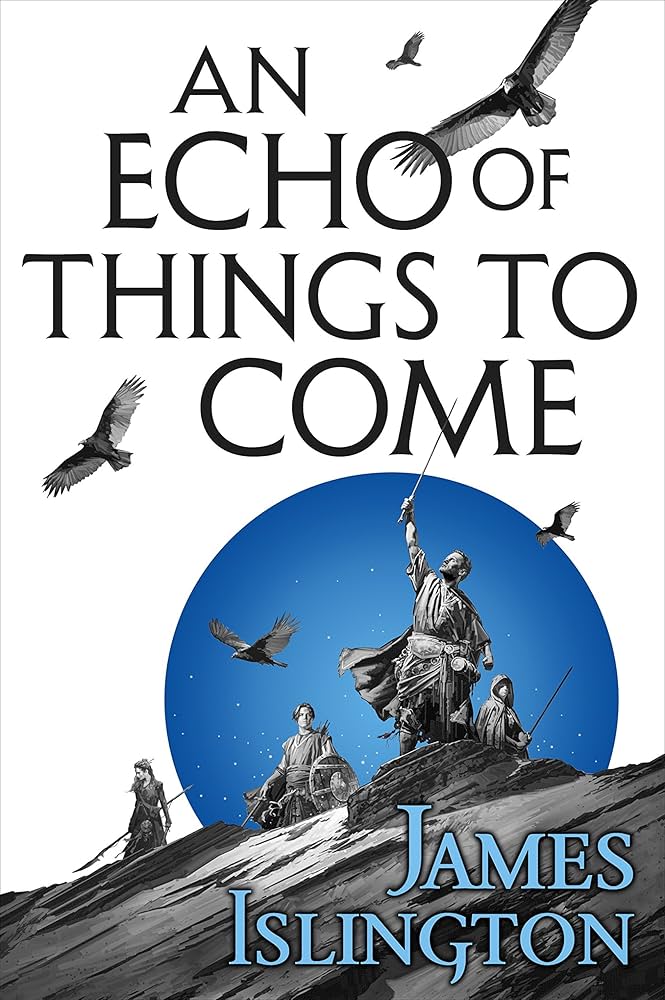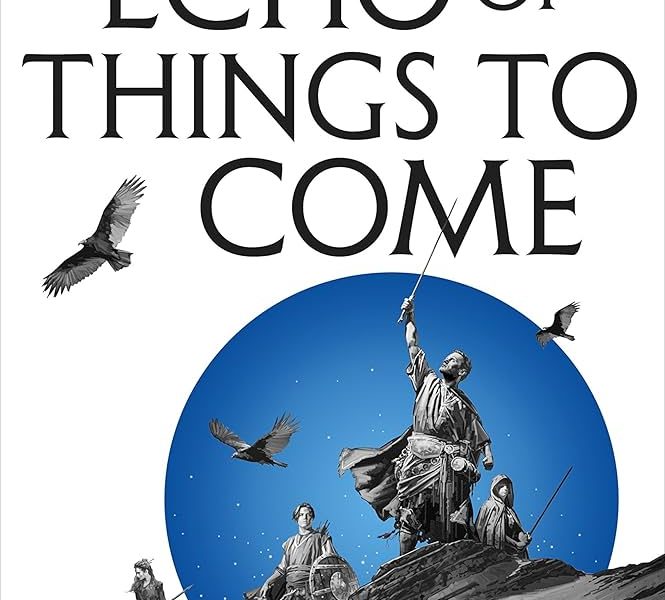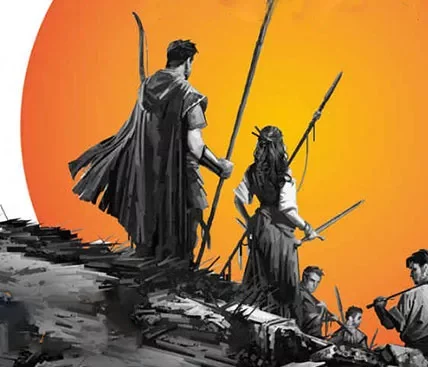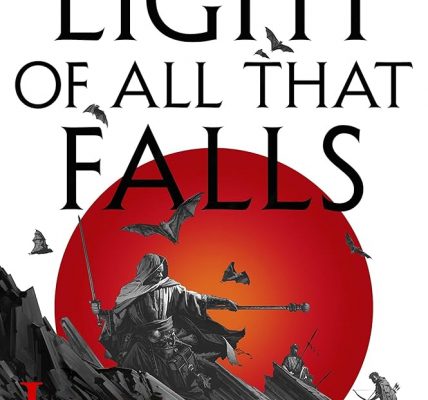
If I’m being honest, An Echo of Things to Come had me gripped at times—but never tightly. It held a touch-and-go grasp on my interest, never quite pulling me fully into its world. The issue lies in its split focus: four main protagonists, each receiving equal page time, but none truly getting the depth they deserve. Every time a character steps into the spotlight, the pacing feels rushed—as if Islington is racing through a narrative already mapped out in a limited word count.
That’s not to say this sequel lacks merit. Arkein Devaed’s story—Caeden’s story—takes us deep into the past and into the rich history of Andarra, where powerful, godlike Augurs reshaped scattered fiefdoms into kingdoms, often turning themselves into objects of worship. The split between Caeden discovering his horrific past and his dissolute future carried me through the novel, leading to a bitter ending that promises only more pain in the trilogy’s final installment.
Still, An Echo of Things to Come never dazzles the way its predecessor did. It continues the unfortunate trend of pushing characters relentlessly forward through time, as if the reader might be punished for lingering too long with our cast around a fire that doesn’t end in sudden death or monstrous Banes descending upon them. While I enjoyed this novel overall, it’s clear that Islington is still in his authorial infancy. This is a comfortable continuation of The Shadow of What Was Lost, but not an evolution of the series.
The Story So Far
Set roughly three months after the invasion, our characters are scattered across the world of Andarra.
Wirr finds himself in the capital, now reluctantly leading the administration. His position is challenged by distrustful bureaucrats, particularly his own mother, who seeks to reclaim power. Through this struggle, Wirr uncovers the darker legacy of his father, learning of a hidden connection between him and the Shadows of the Shaedraehin.
Caeden, meanwhile, begins a desperate journey to reconnect with his past after learning he is, in fact, Arkein Devaed—the devil of legend and once a servant of Shammaeloth. Yet not everything is as it seems. Haunted by a demon wearing the memories of his wife and chasing fragments of his own identity, Caeden must reconcile the monster he was with the man he’s become—and determine if redemption is truly possible.
While Caeden wrestles with the weight of the past, Asha carries the burden of the future. Warned by a future Davian that she will escape her fate as a Shadow, she now serves as Wirr’s ambassador to the Gifted. But her real mission is to uncover the fate of the Shadows who fled the capital during the invasion—and to piece together her role in a much larger game that’s been in motion for centuries.
Davian and his companion Ishelle, meanwhile, hone their powers in preparation for the journey to the Boundary. Though clearly positioned as the hero of the series, Davian feels strangely underdeveloped, confined to fewer chapters and static locations. He does gain greater mastery over kan and deeper insight into Augur abilities—but he lacks the agency and nuance of Caeden or even Wirr.
The Strengths, the Stumbles
It’s hard to call this book boring—it isn’t. The pacing is brisk, with each chapter driving the story forward. There are no dead spots, no placeholder chapters. The narrative flows smoothly, with characters always engaged—whether battling enemies, seeking truth, or questioning their beliefs.
Caeden, in particular, never seems to stop moving. He’s in a constant state of motion, always transitioning between revelations, battles, and moral dilemmas. Even Asha—who I found less compelling than the rest—has several standout chapters that take the reader to fascinating places (perhaps more fun for us than for her).
That said, some characters still feel sorely underdeveloped. Wirr’s mother and sister, who should be prominent figures in this story, are barely touched upon. Erran and the other Augurs more or less maintain the same personalities they had in book one, showing little growth despite the tragedies they’ve endured.
The action, too, is still disappointing. While it’s a minor gripe in the grand scheme, it’s something I hope Islington improves on. When characters are unleashing massive bursts of raw, fantastical magic, I want to feel it. I want to see it vividly on the page. But instead, we’re left with vague descriptions—more “tell” than “show.” Whatever the opposite of a Sanderlanch is, this is it.
A Draft with Promise
Yes, I’m critical of this novel—but only because I can see the potential it had. So much of this trilogy feels like a polished first draft. I don’t know if Islington was rushed to print, or if editorial oversight didn’t push hard enough, but I’d love to see the Australian author return to this series in 10 or 20 years and give it the treatment it deserves.
An Echo of Things to Come truly feels like an echo of A Shadow of What Was Lost. It never quite lives up to the promise of the first novel. It delivers a handful of brilliant moments—particularly in Caeden’s storyline—and explores meaningful themes like religious devotion and moral ambiguity, but it never goes as deep or wide as it could have.
Still, like the first book, it’s a comfortable introduction to high fantasy. For new readers easing into the genre, this trilogy has its charms. But for those looking for layered characters, bold risks, and grand payoffs, this second volume may fall short.
Final Score: 6.9/10





